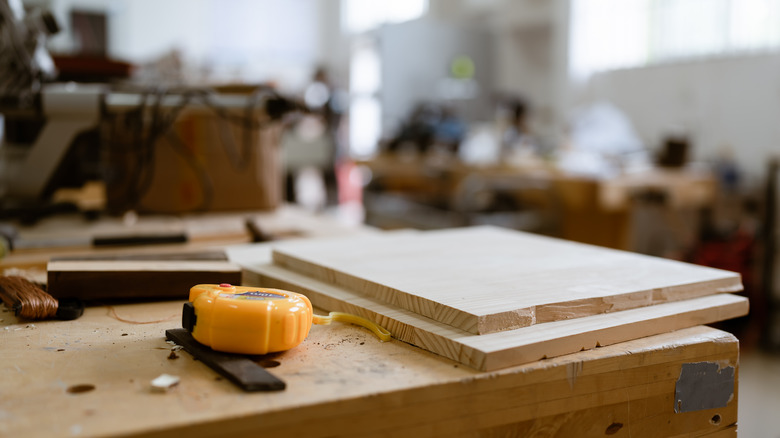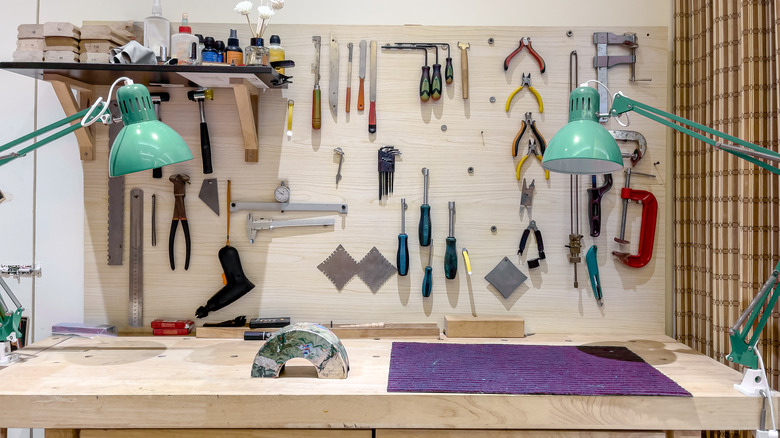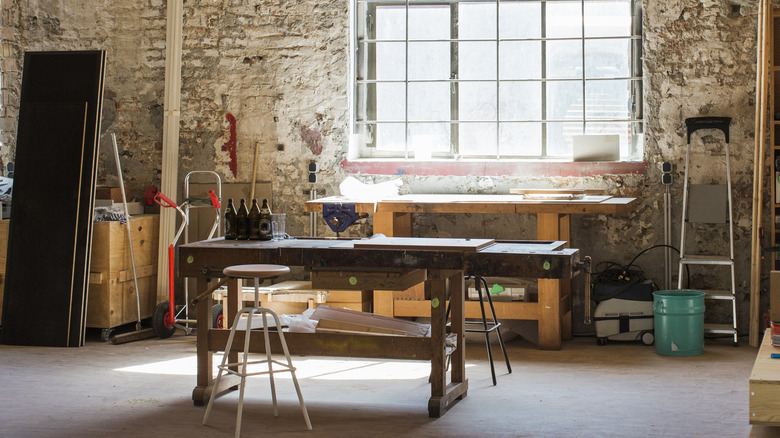The Best Countertop Material For A Garage Workspace (& Which Is Most Affordable)
We may receive a commission on purchases made from links.
Choosing what qualities to prioritize in a countertop material for a workshop is relatively easy: You want the strongest thing you can afford that's compatible with the sort of work you expect to be doing. And while that standard also applies to a garage workspace, there are a few other considerations at play when your work area is attached to your home. You might want it to be somewhat presentable when your garage door is open or when your in-laws are snooping around. At the end of the day, a good all-purpose conclusion is that traditional butcher block is the best overall material, while MDF is typically the cheapest. But there are a lot of caveats embedded in that conclusion, so don't rely too much on generalizations.
Before selecting a material, it's important to understand what you'll be doing with your workbench. The amount of physical wear and tear, exposure to moisture, chemicals, and heat, and suitability for other purposes will all factor in your choice. Also, consider how important the worktop's appearance is to you. Any surface used for wood- or metal-working is going to take a beating and show it. You might also want to factor in which countertop surface is most in keeping with the other elements in your garage. Some countertop materials are easier to modify (for example, to add a sink) than others. Unless you're purchasing a custom installation, this might be worth taking into account.
An overview of garage worktop options
The weakest (and cheapest) material that is occasionally used for workshop countertops is probably MDF, which is easy to work and customize, but is also easily damaged by heat, moisture, and the violence of whacking things with other things. On the other hand, MDF has a very flat, uniform surface, which can be valuable for some assembly and fabrication tasks. When it's laminated with melamine (think builder-grade white closet shelving), MDF stays inexpensive ($38.98 for a ¾-inch, 8-by-4-foot length at The Home Depot) but becomes much more durable and resistant (although not impervious) to moisture. Plain plywood is another option for a medium-strength work surface. It's easy to work and durable, though less so than hardwood. It's damaged so easily by impacts that you might need to replace a plywood countertop periodically, and it's not the prettiest option.
High-pressure laminate, butcher block, and stainless steel are all durable choices. Laminate countertops are fairly strong, inexpensive ($25 to $45 per square foot), and easy to wipe down and maintain. But they are susceptible to being damaged by chemicals, especially solvents. Hardwood butcher block countertops are strong and stable, but they can be expensive ($50-$150 per square foot) and are easily scratched and dented. That said, they are simple to resurface when necessary. Finally, stainless steel work surfaces are resistant to heat, staining, and corrosion. The downsides of stainless steel countertops are that they can be expensive (although this 84-inch long workshop-grade surface costs a reasonable $249.99 from The Home Depot), difficult to customize, and noisy.
Practical matters when choosing a workbench or garage countertop
If you won't apply a lot of force to your worktop, you might benefit from a space-saving folding garage workbench. On the other hand, light users might find a stainless- or butcherblock-topped rolling workbench cart like this $498 Husky cart from The Home Depot sufficient for their needs. But while butcher block and stainless steel are plenty strong, mounting them to a thin substrate or a thin-walled metal cart might not be ideal if you plan to clamp things down in a vise and then hammer on them relentlessly... a frequent use of workbenches. And thin-walled metal carts can be unbelievably noisy when their tops are hammered upon. These carts are more suitable for tinkering, and might make a better rolling toolbox — or you can even turn a Home Depot workbench into an impressive kitchen island. A traditional wood workbench, on the other hand, is designed to withstand lots of abuse and has thick timber legs that transfer force directly (and quietly) to the floor. You can pick up a butcher block-topped workbench that will last decades from Harbor Freight for $179.99.
Depending on the kind of work you're doing, you might also require a specialty worktop. For example, if you work on sensitive electronics, it might make sense to invest in an electrostatic discharge (ESD) worktop. You certainly wouldn't want a conductive surface like stainless or mild steel, which might be more suitable for welding.


